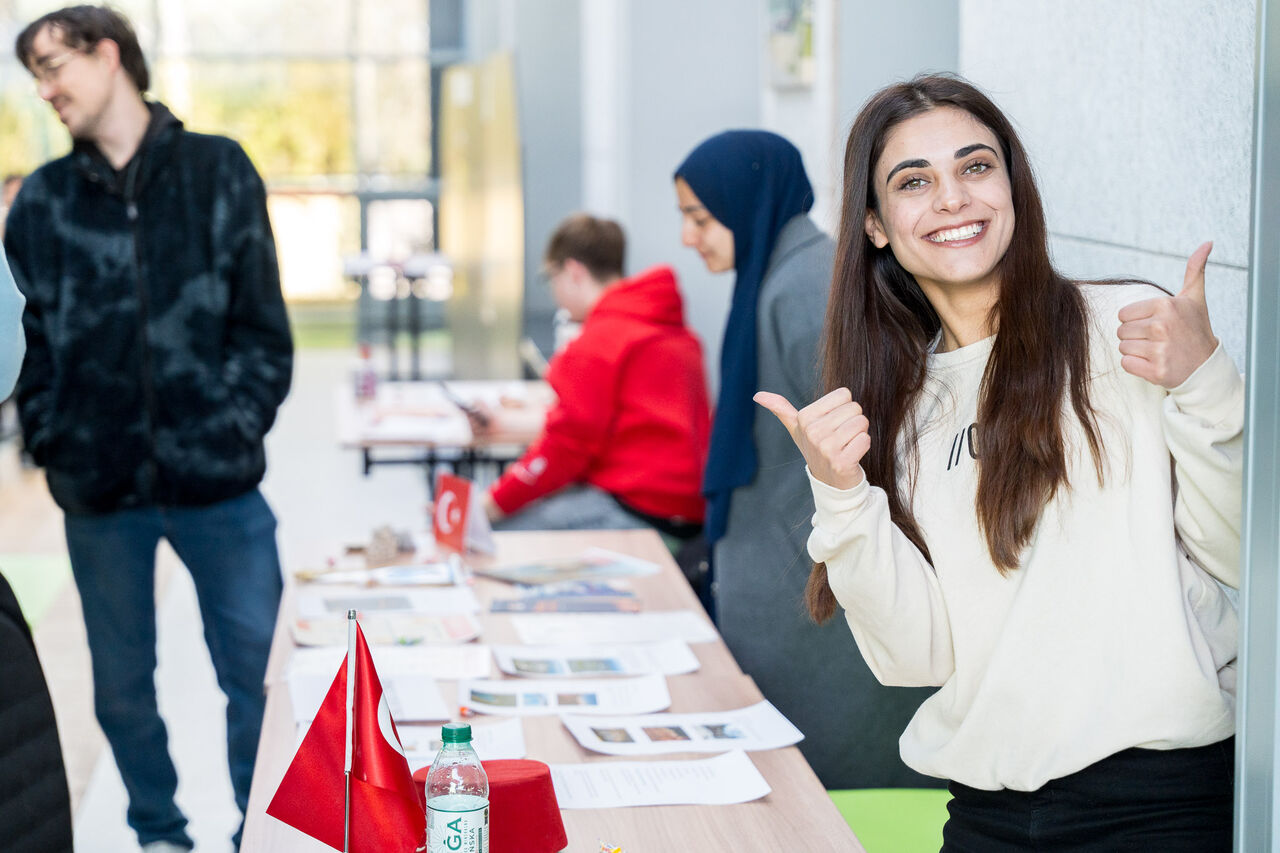The University of Łomża recently hosted an Erasmus+ Open Day aimed at promoting international student exchange. The event attracted a large audience eager to learn about studying abroad, gaining global experience, and practical advice from those directly involved in the program.
Our student ambassadors warmly welcomed guests in their native languages – “Hola,” “Merhaba,” “Gamarjoba,” “Privet,” “Helo,” and “Përshëndetje.” At specially prepared stands, they presented their universities, home countries, and personal interests. Participants had the opportunity to learn about the meanings of Turkish names, take part in various quizzes and puzzles, and discover the benefits of Blended Intensive Programmes (BIP), as well as the opportunities available for studying and internships abroad. One of the highlights was a geography-themed game where visitors could win gadgets prepared by the International Cooperation Department – all accompanied by the aroma of freshly brewed coffee.
Polish representatives also had their stands. Tomasz Sikorski, Andrzej Szymborski, and Magdalena Polkowska shared their experiences from various international trips. Tomasz, representing both Law and Pedagogy, highlighted the potential of Blended Intensive Programmes, in which he participated in Malta, Lithuania, and Belgium. His presentation, enriched with photos and videos, attracted a lot of attention. Meanwhile, Magdalena and Andrzej spoke about long-term mobilities, sharing their experiences from studying in the Czech Republic and Croatia, emphasizing that longer stays allow for deeper cultural immersion and a more authentic international experience.
The event also featured stands hosted by international students representing various cultures and countries. Near the entrance, Lizi from Tbilisi, Georgia, displayed handmade woolen khinkali, a traditional “papakha” hat, and letters written in the Georgian alphabet. Visitors who shared interesting facts about Georgia had a chance to win keepsakes like these letters and mini khinkali.
Ivan Chernysh from Poltava University of Economics and Trade (Ukraine) shared insights about the shared history of our countries and traditional dishes. Anisa Ademi from the Mediterranean University of Albania discussed Mediterranean cuisine, listing dishes such as burek, qofte, tave, fërgesë, gjellë me arra, tave kosi, gjize, petulla, and raki, attracting significant interest from the audience. Her stand became one of the most popular, not only because of the delicious treats but also because of the ongoing geography game – participants struggling to pinpoint certain Balkan countries on the map often relied on her help, turning the contest into a lively competition for university T-shirts, magnets, lanyards, and stickers.
The Turkish stand, the most numerous, featured five students discussing their country’s major attractions, customs, and cultural curiosities. They engaged visitors with both serious conversations and playful exchanges, such as debates about the city of Batman and comparisons between Turkish and Polish kebabs. Opposite their stand was a visually striking display prepared by Eman Anwar Shamekh Abdelghany from Fenerbahçe University (Turkey), originally from Egypt. She drew visitors with handcrafted papyrus exhibits and captivating photos of historical landmarks, eagerly answering every question.
Representatives from the Iberian Peninsula, such as Alejandra and Viktor, enthusiastically shared insights into Spanish traditions and customs, promoting cities like Seville and Cordoba as perfect destinations for studying abroad. Naturally, the topic of football sparked passionate discussions, as it remains a shared passion between Poland and Spain.
The event was opened and closed by staff from the International Cooperation Department, who encouraged participants to reach out for support with any formalities related to mobility. The Erasmus+ Open Day at the University of Łomża not only showcased the rich diversity of cultures but also inspired students to explore new learning opportunities and personal growth. Thanks to international collaboration, the university is becoming a place where education transcends national borders, opening doors to new and inspiring experiences on a global scale.




